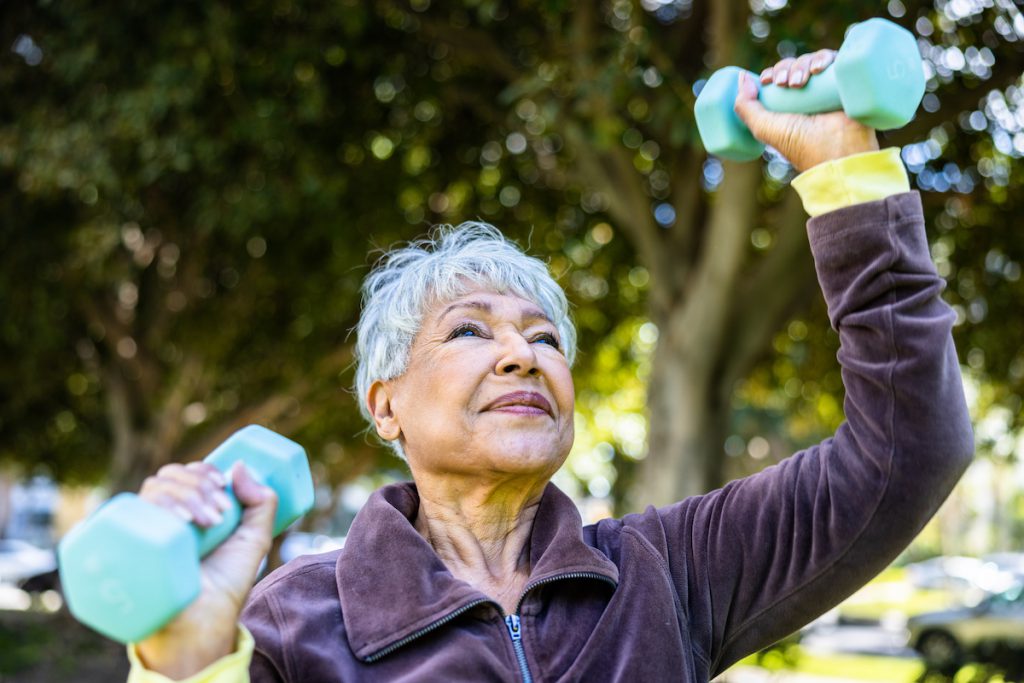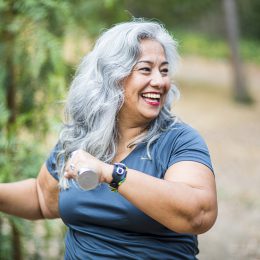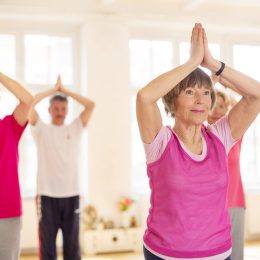The Top Health-and-Fitness News You May Have Missed
If you didn't pay attention to the headlines this year, it’s time to catch up on these five important new healthcare findings for older adults.

With so many health topics in the headlines in 2023, it was tough to know which findings might have a significant impact on your life. We reviewed the latest research and chose some key health-and-fitness takeaways that may improve the wellbeing of people who are 60 and older.
These are the better-health developments you shouldn’t miss.
Add SilverSneakers to your wellness routine! Classes and events are happening daily at participating gyms, online through SilverSneakers LIVE, and at community centers near you. Activate your free online account to get started.
The Headline: Multivitamins May Help Prevent Dementia
People who took a daily multivitamin scored higher on cognitive tests than people who took a placebo, according to a year-long study of more than 3,500 people ages 60 and older in the American Journal of Clinical Nutrition. The cognitive improvement was especially clear in people with existing heart disease.
“The evidence around taking a multivitamin for cognitive health is really compelling,” says Scott Kaiser, M.D. He is the director of geriatric cognitive health for the Pacific Neuroscience Institute in Santa Monica, California. Ideally, he says, you’d get all the nutrients you need from food. However, increasing evidence suggests that multivitamins may be helpful in filling some nutritional gaps.
In addition to a daily multivitamin, a probiotic supplement may also offer promise for better brain health. A review of 10 studies found that probiotic supplementation improved cognitive function within 12 to 24 weeks.
Before taking any new supplement, consult your healthcare team. “It’s important to do your due diligence because some supplements can interact with medications,” says Alex Ristow, M.D. Dr. Ristow is the lead primary care physician at Patina, a primary care provider dedicated to improving the healthcare and aging experience for people ages 65 and older.
The Headline: Strength Training May Lower Blood Pressure Better Than Cardio
Many people look to cardiovascular exercises like walking for heart-health benefits. It is called cardio for a reason, after all. Yet, when it comes to managing blood pressure, new research suggests that strength training may offer a more significant health impact than we realized.
An extensive review of data from 15,827 study participants in the British Medical Journal found that all forms of exercise help lower blood pressure. More intense forms of cardio (like running and cycling) brought it down more effectively than less intense cardio, like walking. But the big shocker was that weight training was more effective at lowering blood pressure than cardio — and weights combined with cardio was more effective than either alone.
“It’s not just about pumping iron to look buff,” says Dr. Kaiser. “There are all sorts of benefits to getting bigger muscles. In addition to driving down pressure, it can also help prevent falls and protect your bones.”
Recommended FREE SilverSneakers On-Demand Class: Strength and Endurance Training Exercises for Seniors
The Headline: The FDA Approves Vaccines For RSV
In May 2023, the Food and Drug Administration approved two vaccines for the prevention of the respiratory syncytial virus (RSV) in people ages 60 and older. Haven’t heard of RSV before? It’s a common respiratory virus that usually causes mild, cold-like symptoms.
But it can be quite serious for older adults. According to the Centers for Disease Control and Prevention, RSV causes as many as 10,000 deaths and 160,000 hospitalizations among people ages 65 and older.
In most adults, the immune system traps and clears RSV in the nasal passages and throat. However, in some people, the virus can gain a foothold in the lower respiratory tract, which includes the windpipe, bronchial tubes, and lungs. This can result in more severe and life-threatening infections.
There are two new vaccines. One is Glaxo Smith Kline’s Arexvy and the other is Pfizer’s Abrysvo. Both reduce the risk of severe RSV infections by about 80%. However, not everyone aged 65 and up needs the vaccine. “People should ask their health care team whether this vaccine is right for them,” says Dr. Kaiser.
Certain health conditions increase your risk of severe RSV, including:
- Blood disorders
- Compromised immunity
- Diabetes
- Heart disease
- Kidney disorders
- Liver disorders
- Lung disease
- Neuromuscular disorders, such as multiple sclerosis
If you’re in a high-risk group, you and your doctor may decide it makes sense to get vaccinated against RSV. If you have no risk factors, you and your healthcare provider may choose to forgo it for now, says Dr. Kaiser.
The Headline: Loneliness Is an Epidemic Among Older Adults
Earlier this year, the U.S. Surgeon General released an unusual advisory. In it, Dr. Vivek H. Murthy wrote, “Loneliness is far more than just a bad feeling — it harms both individual and societal health. It is associated with a greater risk of cardiovascular disease, dementia, stroke, depression, anxiety, and premature death.”
According to the report, feeling socially disconnected can increase your risk of early death as much as smoking 15 cigarettes a day. What’s worse, a separate study published this year determined that 20% of adults over 65 reported feeling socially isolated.
Technology may serve as a solution for those who live alone or can’t leave the house because of mobility issues. According to one small study, people ages 60 and older who were more fluent in social media tended to experience less loneliness. This doesn’t mean you need to create a TikTok account, but checking in with friends online can help protect your health.
“The solution to isolation is connection,” says Dr. Kaiser. “There are so many ways to connect. You can chat with someone on the phone. You can join clubs. You can go to groups. You can use technology. You can get on Zoom. You can simply turn to someone else and ask them how their day is going. It doesn’t have to be complicated.”
Subscribe to our newsletter
It's quick and easy. You could be one of the 13 million people who are eligible.
Already a member? Click to discover our 15,000+ participating locations.
Follow Us
The Headline: Artificial Intelligence Is Transforming Healthcare
If nothing else, 2023 will likely go down in history as the year artificial intelligence (AI) went from science fiction to reality. In medicine, AI applications are so vast that in March, the New England Journal of Medicine began publishing a series called “AI in Medicine.” It also launched a new journal called NEJM AI that is devoted to the role of artificial intelligence in the medical industry.
“The use of artificial intelligence in healthcare is something that’s been developing for years, but we’re really at a tipping point,” says Dr. Kaiser. “It will transform care for people in many ways — some we may not notice and others that are immediately palpable.”
Just in case you’re wondering: Terminator-style robots won’t be replacing general practitioners, physician assistants, or nurses anytime soon. But AI is working behind the scenes to help healthcare providers deliver more effective, efficient, and targeted care, says Dr. Kaiser. For example, radiologists now use AI to interpret the results of health screening tests recommended for people 65 and older.
“Artificial intelligence can augment the human eye, helping to find some really subtle changes in some of these images,” says Dr. Ristow.
AI is also transforming the typical wellness visit. It can take notes, review medical charts, and update medical records. That gives your healthcare providers more time to examine and talk to their patients during the visit, rather than having to continually type notes into a computer.
“This can bring back the experience of sitting down and looking your clinician in the eye,” says Dr. Ristow. “It’s something new that helps us get back to something old — that relationship-based care where you can connect with the person in front of you.”
See our sources:
Multivitamin supplementation and memory: American Journal of Clinical Nutrition
Probiotic supplementation and cognitive function: Neurological Sciences
The effects of exercise on blood pressure: British Medical Journal
Severity of RSV in adults older than 60: Centers for Disease Control and Prevention
RSV virus for older adults: Centers for Disease Control and Prevention
Vaccination recommendations: Centers for Disease Control and Prevention
Advisory on risks of loneliness in older adults: U.S. Surgeon General
Prevalence of social isolation in the U.S.: SSM Population Health
How social media can help older adults feel more connected: International Journal of Human-Computer Interaction
Artificial intelligence in medicine: New England Journal of Medicine
How AI can improve radiology: Diagnostics
Using AI for electronic medical records: Perspectives in Health Information Management
Check Your SilverSneakers Eligibility Instantly
SilverSneakers members can go to thousands of nationwide gyms and fitness locations, plus take SilverSneakers LIVE online classes that are designed for all fitness levels and abilities. If you have a Medicare Advantage plan, it may include SilverSneakers — at no additional cost. Check your eligibility instantly here.
Already a member? Get your SilverSneakers member ID and exclusive fitness and wellness content by activating your online account here.
Not eligible for SilverSneakers? You can still get 200+ free SilverSneakers On-Demand videos and stay in touch with us by creating your online account.





